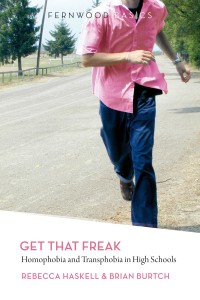- Home
- Books
- Get That Freak
- Review
Review in Herizons Magazine, Winter 2011

Get That Freak
Homophobia and Transphobia in High Schools
What’s in a name? A lot. Results from a national survey show that Canadian schools are fraught with bullying for LGBTQ (lesbian, gay, bisexual, transgender, two-spirited, queer and questioning) students. For example, 70 percent of Canadian students reported hearing expressions like “that’s so gay” every day in school, and only two percent commented that they never heard such remarks.
The good news, however, is that LGBTQ youth are speaking out. Get That Freak is one fine example of the work currently being done on homophobic and transphobic (HTP) bullying. Using a conversational narrative style, Haskell and Burtch spoke to 16 LGBTQ youth about their accounts of HPT harassment in British Columbia high school. Their findings confirm other research in Canada and abroad, which show that some 25 percent of young people experience physical violence due to their sexual orientation, perceived sexual orientation or gender expression. Even more youth are verbally harassed or bullied via text messaging or social networking sites.
Depressed yet? One strength of Get That Freak is that the authors also focus on positive high school experiences, which include celebrating acts of resistance (working within a Foucauldian paradigm). Again, results from their study confirm previous work, which suggests that queer youth who have supportive teachers, supportive schools and supportive school districts/divisions are significantly less likely to report suicidal behaviour and are more likely to have higher levels of school attachment.
Rebecca Haskell and Brian Burtch are to be commended for distinguishing between homophobia and transphobia, especially since research has shown that school are extremely hostile environments for young people who are gender-variant (that is, they do not conform to traditional masculine or feminine scripts). However, the authors overstep their claims regarding such bully. While several participants referred to themselves as being “genderqueer,” no one in their sample identified as being a trans individual. It would be helpful for future work in this are to include a broad range of trans identities.
Nevertheless, this is an outstanding book and a must-read for anyone who is a teacher, school administrator, parent, activist, researcher or simply cares about social justice and security for all young people.- Tracey Peter, Herizons, Summer 2011

